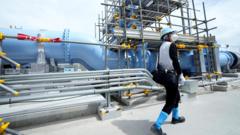In a major policy overhaul, the Japanese government has announced plans to significantly ramp up its reliance on nuclear power to address the nation's energy needs. Approved by the cabinet, the new energy strategy aims for nuclear energy to constitute 20% of Japan's electricity supply by 2040—more than double its current contribution of 8.5%. This policy shift comes as the country grapples with post-Fukushima challenges, compounded by escalating energy demands from sectors like artificial intelligence and semiconductor manufacturing.
Japan Escalates Nuclear Energy Ambitions Amidst Energy Crisis

Japan Escalates Nuclear Energy Ambitions Amidst Energy Crisis
Japan is set to enhance its nuclear energy usage, marking a significant policy transition in light of increased energy demands, particularly from emerging technologies.
Despite past traumatic experiences stemming from the devastating Fukushima disaster in 2011, Japan's energy officials assert the necessity of revisiting nuclear power as a means to achieve energy sustainability and carbon neutrality. The government's latest policy abandons previous language advocating for reduced nuclear reliance, illustrating a dramatic turnaround influenced by global energy instability.
While the plan's approval by parliament is pending, officials emphasize that Japan's reliance on imports for 90% of its energy resources necessitates exploring all available options, including nuclear energy. Lawmaker Daishiro Yamagiwa noted the pressing requirements imposed by contemporary technological advancements and the impacts of geopolitical conflicts affecting fossil fuel availability.
Conversely, energy experts express concern that increased nuclear reliance poses safety risks and leads to significant financial burdens linked with uranium imports. Professor Kenichi Oshima highlighted the heightened risk of nuclear accidents, especially considering Japan's seismic activity and historical avoidance of new nuclear projects due to local opposition.
Nuclear energy remains a contentious subject for many citizens still reeling from the Fukushima disaster, which remains a stark reminder of the potential dangers associated with nuclear power. Local residents, such as Tokyo's Yuko Maruyama, voice apprehensions over the safety implications for future generations and call for alternative energy solutions.
Environmental advocates, including Greenpeace, have condemned the decision to promote nuclear energy, arguing that the long-term repercussions of radioactive waste and potential disasters cannot be justified. These concerns resonate particularly following Japan's controversial discharge of treated wastewater from Fukushima in 2023, prompting international backlash.
Achieving the government's nuclear objectives may prove challenging, as experts predict that 33 of Japan's reactors will need to be brought back online amid public hesitation and extensive safety protocol requirements. The evolution of Japan's nuclear energy policy underscores a complex balancing act between addressing urgent energy needs and mitigating ecological and social risks.
While the plan's approval by parliament is pending, officials emphasize that Japan's reliance on imports for 90% of its energy resources necessitates exploring all available options, including nuclear energy. Lawmaker Daishiro Yamagiwa noted the pressing requirements imposed by contemporary technological advancements and the impacts of geopolitical conflicts affecting fossil fuel availability.
Conversely, energy experts express concern that increased nuclear reliance poses safety risks and leads to significant financial burdens linked with uranium imports. Professor Kenichi Oshima highlighted the heightened risk of nuclear accidents, especially considering Japan's seismic activity and historical avoidance of new nuclear projects due to local opposition.
Nuclear energy remains a contentious subject for many citizens still reeling from the Fukushima disaster, which remains a stark reminder of the potential dangers associated with nuclear power. Local residents, such as Tokyo's Yuko Maruyama, voice apprehensions over the safety implications for future generations and call for alternative energy solutions.
Environmental advocates, including Greenpeace, have condemned the decision to promote nuclear energy, arguing that the long-term repercussions of radioactive waste and potential disasters cannot be justified. These concerns resonate particularly following Japan's controversial discharge of treated wastewater from Fukushima in 2023, prompting international backlash.
Achieving the government's nuclear objectives may prove challenging, as experts predict that 33 of Japan's reactors will need to be brought back online amid public hesitation and extensive safety protocol requirements. The evolution of Japan's nuclear energy policy underscores a complex balancing act between addressing urgent energy needs and mitigating ecological and social risks.






















